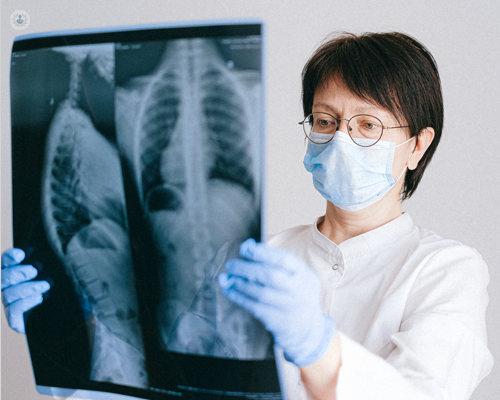Coughing up blood (haemoptysis)
Dr James Ramsay - Pulmonology & respiratory medicine
Created on: 03-27-2018
Updated on: 03-23-2023
Edited by: Conor Dunworth
What is haemoptysis?
Coughing up blood (the medical term for which is haemoptysis) can be a symptom of a number of conditions. As some of these conditions can be serious, you should consult a doctor if you cough or spit up blood.

However, although it is a worrying symptom, it is uncommon for it to be indicative of a serious problem in younger patients who are otherwise physically well, whereas in older patients, or patients who smoke, it is more of a cause for concern.
What are the symptoms of coughing up blood?
Haemoptysis can manifest in a few different ways:
- Small amounts of bright red blood
- Frothy sputum (phlegm and saliva) streaked with blood
- Dark blood
- Blood containing bits of food, or what appear to be coffee grounds
While the first two varieties are often caused by prolonged coughing or a chest infection, the latter two could indicate the problem lies in the digestive system, which is likely a more serious problem.
What causes you to cough up blood?
There are a number of possible causes of haemoptysis.
Common causes include:
- A severe, long-lasting cough
- A chest infection
- Bronchitis
- Bronchiectasis
- Nosebleeds
- Bleeding in the mouth or throat

Less common causes of coughing up blood include:
- Tuberculosis
- Lung cancer
- Oesophageal cancer
- Pneumonia
- Pulmonary embolism
- Pulmonary oedema
- Taking anticoagulants
An internal injury such as broken ribs could also cause you to cough up blood. If you begin coughing up blood after a fall or chest injury, it is important to seek medical attention.
Sometimes the cause cannot be found, and the problem quickly resolves. Nonetheless, given the severity of some of the conditions that can cause you to cough up blood, you should get yourself checked by a doctor if you experience this symptom.
Can acid reflux cause coughing up blood?
Acid reflux is associated with vomiting blood due to bleeding in the oesophagus, and while it may look similar, it isn't the same as coughing up blood. Coughing up blood is where blood or bloody mucus is brought up from your lungs and throat.
What infections cause haemoptysis?
Tuberculosis can cause coughing up blood while other upper respiratory infections lead to conditions which haemoptysis is a symptom of. The most common conditions are bronchitis, bronchiectasis and a severe form of pneumonia called necrotising pneumonia.

Common causes of coughing up blood in children are lower respiratory tract infections and aspiration of foreign bodies. This is where food or other swallowed objects can get stuck in the oesophagus. They can sometimes cause perforation, which can lead to bleeding.
How do I know when coughing up blood is serious?
Coughing up blood should always be medically attended to. It's very important to arrange an appointment with your GP if you experience the following:
- Coughing up more than a few teaspoons of blood;
- There's blood in your urine or stools;
- A loss of appetite or have unexplained weight loss alongside haemoptysis;
- Chest pain, dizziness, fever or light-headedness or shortness of breath that gets worse.
How can coughing up blood be prevented?
Given the numerous possible causes, it may be impossible to prevent. However, smoking, breathing polluted air, and ignoring a persistent cough are all risk factors.
What's the treatment for coughing up blood?
The treatment for haemoptysis depends entirely on the cause. The first step is diagnosis of coughing up blood. Your doctor may run tests such as a chest X-ray, chest CT scan, bronchoscopy, sputum culture, or a lung biopsy in order to examine what is going on inside you and eliminate possible causes, or identify the problem.

If it turns out to be nothing more than irritation of the throat due to excessive coughing, it could be that throat lozenges can stop the haemoptysis. In the case of an infection, medication prescribed by your doctor may provide the solution. If the bleeding is severe, you may have to be hospitalised, and some conditions that cause haemoptysis may require surgical intervention.
What type of doctor treats haemoptysis?
If you require specialist medical attention for coughing up blood, pulmonologists and respiratory specialists treat the chest and respiratory tract.
